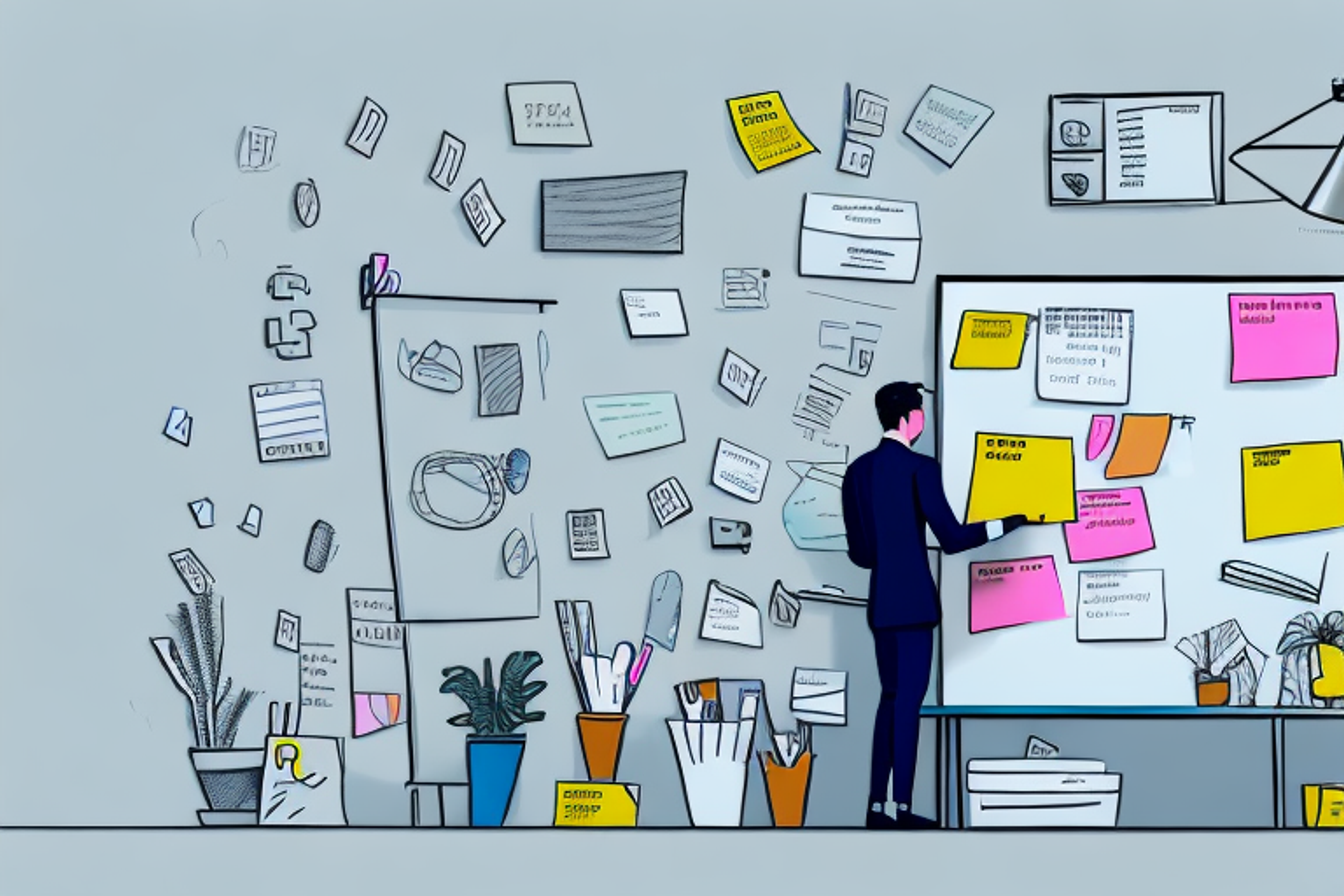How to Write a Powerful Product Management Cover Letter
Discover how to create a standout cover letter for product management roles with our in-depth guide.
Posted March 6, 2025

Table of Contents
Your cover letter is a crucial part of your job application. It provides an opportunity to show off your skills, experience, and passion for the product management role you're applying for. In this guide, we'll walk the process of writing a compelling cover letter specifically tailored for product management positions, helping you stand out and improve your chances of landing your dream job.
Creating an effective product manager cover letter requires attention to detail and an understanding of the role. In this article, we'll cover the key components to include, how to customize your letter for specific product management roles, and common mistakes to avoid. By following these tips, you'll be better prepared to write a perfect cover letter that captures the attention of hiring managers and improves your chances of securing an interview.
What Is The Purpose of a Product Manager Cover Letter?
A cover letter is essential for various roles, including a product manager position, in order to showcase relevant skills and experiences. It acts as a personal introduction, giving candidates the opportunity to showcase their skills, relevant experience, and enthusiasm for the role. Unlike a resume, which outlines qualifications in a specific format, the cover letter allows candidates to tell a more engaging story—aligning their expertise with the company's goals and culture.
While resumes provide a snapshot of qualifications, the cover letter allows candidates to craft a compelling narrative that aligns their abilities with the company’s objectives and culture. This personalized approach can set candidates apart and significantly increase their chances of being noticed by hiring managers.
Your cover letter is a crucial part of your job application. It provides an opportunity to show off your skills, experience, and passion for the product management role you're applying for. In this guide, we'll walk the process of writing a compelling cover letter specifically tailored for product management positions, helping you stand out and improve your chances of landing your dream job.
Creating an effective product manager cover letter requires attention to detail and an understanding of the role. In this article, we'll cover the key components to include, how to customize your letter for specific product management roles, and common mistakes to avoid. By following these tips, you'll be better prepared to write a perfect cover letter that captures the attention of hiring managers and improves your chances of securing an interview.
What Does the Product Manager Letter Accomplish?
A product manager cover letter is an important document that accompanies a resume or CV when applying for a product manager position. Its main purpose is to introduce yourself to the hiring manager, showcase your skills and experiences relevant to the product manager position, and demonstrate your passion for product management. This document serves as a bridge between your resume and the hiring manager, providing context and personality to your application.
1. It introduces you to the hiring manager
When writing a product manager cover letter, it’s essential to introduce yourself to the hiring manager in a professional and engaging manner. Start by addressing the hiring manager by their name, if possible, and clearly state the position you’re applying for. This will help establish a personal connection and show that you’ve taken the time to research the company and the role. A personalized greeting can make your cover letter stand out and demonstrate your attention to detail.
2. It showcases the skills and experiences relevant to the position
A product manager cover letter should highlight your relevant skills and experiences that align with the job requirements. This can include project management skills, the ability to conduct market research, and analysis, as well as experience with software development, ecommerce, or IT. Be specific and provide concrete examples of how you’ve applied these skills in previous roles. For instance, you might discuss a successful product launch you led or how you conducted market research to drive product strategy. These examples help paint a picture of your capabilities and how you can contribute to the company’s success.
3. It gives you space to demonstrate your passion for product management
A well-written cover letter should also demonstrate your passion for product management and your enthusiasm for the company and the role. Explain why you’re interested in the position and how you can contribute to the company’s success. This will help show the hiring manager that you’re not just looking for a job, but that you’re genuinely interested in the company and the role. Your enthusiasm can be a deciding factor for hiring managers, as it indicates a strong cultural fit and a high level of motivation.
What is a Product Manager?
A product manager is the linchpin in the development and launch of a product, guiding it from initial concept to final delivery. This role requires a deep understanding of the market, customers, and technology to make informed decisions that align with the company’s goals. As a product manager, you will work closely with cross-functional teams, including engineering, design, and marketing, to ensure the product meets customer needs and achieves business objectives.
To excel in a product manager position, you must possess a unique blend of skills. Project management skills are essential for coordinating tasks and ensuring timely delivery. Market research is crucial for understanding customer needs and market trends, enabling you to make data-driven decisions. Leadership skills are necessary to inspire and guide your team towards successful product launches.
In addition to these technical skills, strong soft skills are equally important. Effective communication is key to collaborating with diverse teams and stakeholders. Problem-solving abilities help you navigate challenges and find innovative solutions. The ability to balance the needs of different teams and stakeholders ensures that the product is delivered on time and within budget.
By highlighting these skills and experiences in your cover letter, you can demonstrate your suitability for the product manager position and show hiring managers that you have what it takes to drive product success.
How a Strong Cover Letter Sets You Apart
A product manager cover letter is not just an accessory to your resume; it is often the main feature that determines whether your application stands out. In a pool of near-identical resumes, a compelling cover letter can move an application from the 'maybe' pile to the 'let's interview this person' pile. It offers candidates a chance to tell their story, highlight their skills, and align their experiences with the company's needs, providing unique value beyond what a resume alone can convey.
Key Elements to Include in Your Cover Letter
To craft an effective product manager cover letter, candidates should include the following elements:
- Contact Information: Your name, phone number, email address, and links to a LinkedIn profile or portfolio, if applicable.
- A Strong Introduction: A compelling opening that clearly states your interest in becoming a product manager at the specific organization.
- Relevant Skills and Experiences: Highlight abilities that align with the job description, such as project management skills, market research, or technical expertise.
- Enthusiasm for the Role and Company: Express a genuine interest in the position and the organization’s mission. You want to show that you a great culture fit for the organization as a whole.
- A Brief, Impactful Conclusion: Wrap up the letter concisely with a clear call to action, such as a request for an interview
Skills and Experience for a Product Manager Cover Letter
Your cover letter is an opportunity to highlight specific skills and experiences that set you apart from other candidates. Some common skills include:
- Lead cross-functional teams effectively
- Impress leadership with innovative solutions
- Enhance user experience through strategic planning and market analysis
By highlighting compelling stories and key achievements—such as successful product launches or notable revenue growth—candidates can leave a lasting impression on hiring managers, conveying the sense that their expertise is invaluable and urgently needed.
How to Tailor Your Cover Letter
Product management roles vary significantly depending on the industry, company size, and product type – for example, you may be recruiting for a software product management position, ecommerce product management position, technical product manager position, or even a product designer.
When beginning to write your cover letter, it’s important to make sure your cover letter is specifically tailored to the position you are applying for. The experiences and skills you include should match those in the job description. You want to not just show that you are an accomplished and capable candidate, but that you are a perfect match for the role at hand. Before drafting your cover letter, review the job description and highlight any keywords that stand out to you. Then, think about your past experiences and how you can effectively portray what the job requires with them.
For example, if you’re applying for a digital product manager position, emphasize your experience with user-centric design, data-driven decision-making, and market analysis. Similarly, if the role involves managing the entire product lifecycle, focus on your experience in strategic planning, agile methodologies, and leading cross-functional teams.
Use keywords and phrases directly from the job listing to demonstrate that you are the ideal candidate for the role and to help your application pass through Applicant Tracking Systems (ATS).
Best Practices for Crafting a Product Manager Cover Letter
To enhance the effectiveness of your cover letter, consider these best practices:
Research the Company Thoroughly
Before writing the cover letter, research the prospective employer extensively. Focus on:
- The company as a whole, as well as the team you'll be joining
- Current business objectives, market position, and strategic goals
- Key projects or products and how your skills can contribute to their success
For instance, if you’re applying for a digital product manager position at an e-commerce company, emphasize your experience in user-centric design, gathering customer feedback, and driving product strategy through data-driven decision-making.
Understand the company's culture and values
When applying for a product manager position, understanding the company culture and values is crucial. A product manager must align with the company’s mission and values to thrive in the role. Researching the company culture and values can provide insights into what the company is looking for in a product manager and help you tailor your application to meet their needs.
Consider the following questions when researching the company culture and values:
- What is the company’s mission and vision?
- What are the company’s core values?
- How does the company approach product development and launch?
- What is the company culture like, and how does it impact the way teams work together?
By answering these questions, you can gain a deeper understanding of the company’s priorities and work environment. Use this information to tailor your cover letter, demonstrating that you are not only a strong fit for the role but also aligned with the company’s values and culture. This alignment can make a significant difference in how your application is perceived by hiring managers.
Take advantage of the job description
Align your experiences and skills with the specific requirements listed in the job description. Highlight how your background makes you an ideal fit for the role. This demonstrates that you have thoroughly considered the position and can contribute effectively to the company’s goals.
Using relevant keywords from the job description is crucial. This not only demonstrates that your skills align with the role but also helps your cover letter pass through Applicant Tracking Systems (ATS) used by many companies. Incorporate terms like "cross-functional teams," "market research," "product strategy," "customer needs," and "data-driven decision making" naturally within your content.
Personalize the greeting
Finding and using the hiring manager's name in your cover letter is crucial. Addressing the hiring manager by name whenever possible personalizes the greeting, shows that the cover letter is tailored specifically for them, and reflects genuine interest in the position. This effort demonstrates respect and can differentiate your application from others that use generic greetings. If you cannot find the hiring manager’s name, use a respectful generic salutation like “Dear Hiring Manager” or “Dear [Company Name] Recruiting Team.”
Showcase real results (that you actually helped drive)
To make a strong impression, highlight specific outcomes you've driven in previous roles, such as:
- Increases in user acquisition and retention rates.
- Measures taken to reduce operational costs.
- Improvements in customer satisfaction and NPS scores.
- Successful product launches led or supported.
Quantify these achievements wherever possible to add credibility and demonstrate your ability to deliver tangible results. For example, stating "I led a product launch that increased revenue by 30% in six months" is much stronger than saying "I helped launch a product." Concrete figures give hiring managers a clear understanding of your impact and reinforce your qualifications.
Show your enthusiasm
Clearly convey your excitement about the specific role and the company. Addressing the hiring manager's name can demonstrate genuine interest and respect, enhancing the effectiveness of the cover letter. For example, when applying to a tech giant like Google, emphasize your alignment with their culture of innovation and your commitment to creating impactful products. Similarly, for a senior product manager position at a financial services company, express enthusiasm for their mission to drive financial inclusivity and digital innovation.
Conclude with gratitude and professionalism
Wrap up your cover letter by expressing appreciation for the hiring manager's time and consideration of your application. A confident yet respectful closing can leave a lasting, positive impression. Demonstrating your professionalism and eagerness to contribute to the company, express your availability for an interview or further discussions to explore how your product management expertise aligns with their needs. Ending on a courteous note ensures you maintain a strong, professional tone throughout your application.
How to Start and End Your Cover Letter
Introduction and Opening
When writing a product manager cover letter, it’s essential to start with a strong introduction that captures the reader’s attention. This section should include a formal greeting, addressing the hiring manager by their name, followed by a brief introduction that highlights your interest in the product manager position. The opening paragraph should be concise, yet informative, and provide a clear overview of your background and qualifications.
Here’s an example of an introduction:
“Dear [Hiring Manager’s Name],
I am excited to apply for the Product Manager position at [Company Name], as advertised on [Job Board/Source]. With [Number] years of experience in product management and a proven track record of delivering successful product launches, I am confident that I possess the skills and expertise required to excel in this role. My passion for product management, combined with my ability to drive results and lead cross-functional teams, makes me an ideal candidate for this position.”
Closing and Signing Off
The closing section of your product manager cover letter is just as important as the introduction. This is where you summarize your key points, reiterate your interest in the position, and provide a clear call-to-action. The closing paragraph should be brief, yet impactful, and leave a lasting impression on the reader.
Here’s an example of a closing:
“In conclusion, I believe that my skills, experience, and passion for product management make me an ideal candidate for this position. I would welcome the opportunity to discuss my application and how I can contribute to the success of [Company Name]. Thank you for considering my application. I look forward to the opportunity to meet with you to discuss this further.
Sincerely,
[Your Name]”
How to Format and Proofread Your Cover Letter
- Use a Clean, Professional Layout: Ensure your cover letter has a well-organized structure with clear headings and sections. This makes it easier for hiring managers to quickly find and understand key information.
- Incorporate Bullet Points Where Appropriate: Use bullet points to highlight key achievements or skills, which improves readability and draws attention to important details.
- Maintain Plenty of White Space: Leave adequate spacing between paragraphs and sections to make the content visually appealing and easy to read.
- Choose a Standard, Easy-to-Read Font: Use a professional font like Arial, Times New Roman, or Calibri, and keep the font size between 10-12 points to ensure readability.
- Keep Formatting Consistent Throughout: Maintain uniformity in text alignment, font size, and style to create a cohesive and polished look.
- Proofread Multiple Times for Errors: Review your cover letter multiple times to catch grammatical errors, typos, or formatting inconsistencies that could negatively impact your application.
- Avoid Unnecessary Jargon and Buzzwords: Steer clear of using overused phrases or jargon that can dilute the impact of your message. Focus on clear and concise language.
- Highlight Specific Examples and Achievements: Emphasize your relevant skills and accomplishments with concrete examples that showcase your qualifications for the product manager position.
- Seek Feedback from Others: Consider asking a colleague, mentor, or professional in your network to review your cover letter and provide constructive feedback.
- Use Online Tools to Check Grammar and Style: Utilize tools like Grammarly or Hemingway to ensure your writing is error-free and clear, enhancing the overall quality of your cover letter.
By following these formatting and proofreading tips, you can create a polished and professional product management cover letter that effectively communicates your qualifications and leaves a positive impression on hiring managers.
Getting Feedback and Editing
Once you have drafted your cover letter, it’s essential to get feedback and edit it carefully. A well-polished cover letter can significantly enhance your chances of landing an interview. Start by asking a friend, mentor, or colleague to review your cover letter and provide feedback on content, structure, and grammar. Use this feedback to make revisions and improve your cover letter.
Here are some tips for editing your cover letter:
- Read it Aloud: Reading your cover letter out loud can help you catch awkward phrasing and ensure it flows naturally.
- Use Tools: Utilize grammar and spell checkers to catch any errors, but don’t rely solely on them.
- Seek Feedback: Ask a friend or mentor to review your cover letter and provide constructive feedback.
- Revise and Edit: Make revisions based on the feedback you receive and carefully edit your cover letter to ensure it is clear, concise, and error-free.
By taking the time to get feedback and edit your cover letter, you can ensure it is well-written and effective, making a strong impression on hiring managers.
What Are the Benefits of a Well-Written Cover Letter?
A well-written cover letter can increase your chances of getting an interview by showcasing your skills and experiences relevant to the product manager position. It can also demonstrate your passion for product management and your enthusiasm for the company and the role. This can help you stand out from other applicants and make a positive impression on the hiring manager. By clearly articulating your value proposition and aligning it with the company’s needs, you can make a compelling case for why you should be invited for an interview.
By following these tips and guidelines, you can create a well-written product manager cover letter that showcases your skills and experiences, demonstrates your passion for product management, and increases your chances of getting an interview. A thoughtful and targeted cover letter can be the key to unlocking new career opportunities and advancing in the competitive field of product management.
How to Follow-Up After Submitting Your Cover Letter
1. Wait a Week Before Following Up: Allow at least a week after submitting your product management cover letter and application before sending a follow-up email. This shows patience and respect for the hiring manager’s time. (Note: This one-week timeline does not translate to interviews; you can and should send a follow-up thank you email much earlier than one week after you’ve completed the interview.)
2. Send a Polite and Professional Email: Compose a courteous email to the hiring manager or recruiter to express your continued interest in the position. Keep the tone professional and positive.
3. Restate Your Enthusiasm for the Role: Use the follow-up email to reaffirm your excitement about the opportunity and your desire to contribute to the company's success.
4. Highlight How Your Skills Align with the Company's Goals: Briefly mention how your skills, such as strategic planning, leadership, and product management expertise, align with the company's specific goals and needs.
5. Keep the Message Concise: Ensure your follow-up email is concise and to the point. Avoid writing lengthy paragraphs; instead, make your key points clear in a few sentences.
6. Express Your Availability: Indicate your openness to further discuss your application or schedule an interview at the convenience of the hiring manager.
7. Thank the Hiring Manager for Their Time: Show appreciation for the hiring manager’s time and consideration, reinforcing your professionalism and gratitude.
8. Proofread Your Follow-Up Email: Double-check your email for any typos or errors to maintain a high level of professionalism.
9. Avoid Being Pushy or Overly Aggressive: Be mindful not to come across as impatient or demanding in your follow-up. A single, well-crafted email is usually sufficient.
10. Maintain a Positive Attitude Regardless of the Outcome: Regardless of the response, remain positive and professional. This will leave a good impression for any future opportunities with the company.
By adhering to these best practices, you demonstrate your enthusiasm and professionalism, potentially increasing your chances of securing an interview for the product manager position.
Common Mistakes to Avoid in Your Product Manager Cover Letter
To maximize the impact of your cover letter, avoid these common pitfalls:
- Generic Content: Tailor your cover letter to each specific role and organization to show genuine interest.
- Exceeding One Page: Keep the cover letter concise and impactful, ideally within one page.
- Rehashing the Resume: Use the cover letter to provide additional context, not to repeat information already present in your resume.
- Focusing on Weaknesses: Emphasize your strengths and relevant experiences instead of highlighting any lack of specific skills.
- Neglecting Proofreading: Carefully proofread your cover letter for errors and consider having a peer review it.
- Discussing Past Employers Negatively: Focus on your current skills and future potential instead of speaking negatively about previous employers.
- Providing Unsolicited Salary Information: Include salary expectations only if requested in the job posting.
- Boasting Without Context: Avoid excessive self-promotion; instead, demonstrate how your skills will benefit the prospective employer.
- Inflexible Formatting: Be adaptable in your format to best showcase your qualifications and align with the company's culture.
By avoiding these mistakes, you can craft a compelling product manager cover letter that effectively communicates your value proposition and increases your chances of securing an interview.
Perfect Your Cover Letter Draft with Expert Guidance
Leland coaches can be a valuable resource when improving your overall career profile, including crafting your cover letter. These experienced professionals provide personalized support to help you navigate key areas like networking, interviews, and resume reviews. With expert guidance, you can present yourself effectively, ensuring your cover letter, resume, and LinkedIn profile reflect your unique skills and experiences.
Here are some ways Leland coaches can enhance your job application process:
- LinkedIn Review: Coaches help you optimize your LinkedIn profile, ensuring it complements your cover letter and resume. A polished LinkedIn profile creates a cohesive professional image that stands out to recruiters.
- Execution: Leland coaches guide you in executing your cover letter and job application strategy. They help refine your message, ensuring your cover letter is clear, targeted, and aligns with your job search goals.
- Resume Review: Coaches provide thorough resume reviews to align it with your cover letter. This ensures a unified narrative that highlights your skills and experiences, strengthening your overall application.
- Networking Strategy: Coaches can assist you in developing a personalized networking strategy. They’ll teach you how to effectively build connections and leverage your network in a way that complements your job search efforts.
- Product Case Interview Prep: For those in product management or similar fields, coaches can prepare you for product case interviews. This preparation ensures you’re confident and ready to impress during the interview stage.
- Behavioral Interview Prep: Coaches provide valuable feedback on how to navigate behavioral interviews. They help you communicate your experiences effectively, ensuring your cover letter aligns with the strengths you’ll discuss in interviews.
By working with Leland coaches across these areas, you can strengthen not only your cover letter but your entire application process, making you a more compelling and confident candidate.
FAQs
What is the purpose of a product manager cover letter?
- A product manager cover letter introduces you to the hiring manager, highlights your relevant skills and experiences, and demonstrates your passion for product management and understanding of the company's needs. It aligns your abilities with the company's objectives, setting you apart from other applicants.
How do I tailor my product manager cover letter to a specific role?
- Start by researching the company and the job description. Identify key responsibilities and skills required for the role and incorporate relevant keywords. Highlight experiences and achievements that align with these requirements. Personalize the greeting and mention specific company goals or values that resonate with you.
What are the key elements to include in a product manager cover letter?
- Include your contact information, a compelling introduction, relevant skills and experiences, enthusiasm for the role and company, and a concise conclusion with a call to action.
How do I tailor my product manager cover letter to a specific role?
- Start by researching the company and the specific job description. Identify key responsibilities and skills required for the role and incorporate relevant keywords. Highlight your experiences and achievements that align with these requirements. Personalize the greeting, and mention specific company goals or values that resonate with you.
What are the key elements to include in a product manager cover letter?
Your cover letter should include:
- Accurate contact information (name, phone number, email)
- A compelling introduction stating your interest in the role
- Highlighting relevant skills and experiences
- Demonstrating enthusiasm for the company and the position
- A concise conclusion with a call to action
6. How do I address a cover letter if I don't know the hiring manager's name?
If you don't know the hiring manager's name, address the letter to the relevant team or department (e.g., "Dear Hiring Manager" or "Dear [Company Name] Recruiting Team"). However, try to find the hiring manager's name through the company website, LinkedIn, or job posting whenever possible.
7. What common mistakes should I avoid in a product manager cover letter?
- Avoid these common mistakes:
- Using a generic cover letter
- Exceeding one page
- Simply repeating your resume content
- Highlighting weaknesses or lack of certain skills
- Neglecting to proofread for errors
- Providing unsolicited salary information
- Using a rigid format that doesn’t highlight your unique qualifications
How can I make my cover letter stand out to hiring managers?
- Use specific examples to demonstrate your skills, such as leading cross-functional teams, conducting market research, or driving product success. Quantify your achievements when possible, show a clear understanding of the company's goals, and express genuine enthusiasm for the role and the industry.
Should I use keywords in my product manager cover letter?
- Yes, using relevant keywords from the job description is essential. This not only demonstrates that your skills align with the role but also helps your cover letter pass through Applicant Tracking Systems (ATS) used by many companies.
Is it necessary to follow up after submitting my cover letter?
- Yes, following up is a good practice. Wait at least a week before sending a polite follow-up email to the hiring manager or recruiter, reaffirming your interest in the position and inquiring about the next steps.

















